Japanese Baseball: For Love of the Lame?
The State of Japanese Baseball
With my cigarette gripped between my teeth, I peeled the backing off another sheet of flypaper and set it at the edge of my underwear and T-shirt heap. A half dozen other sheets, filled to capacity with shiroari (flying termites), lined the edge of a nearby wall. I backed-up, overstepping an empty 12-pack carton with my eyes fixed on the tube, and plopped back onto my couch for the conclusion of the top of the eighth.
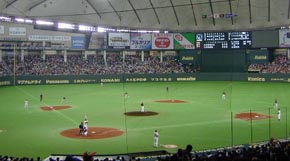 The
new Giants pitcher was beginning his warm-up tosses before
attempting to preserve the their one-run lead in the face
of a Carp bases loaded, no-out, threat. After being seated,
I cracked a fresh beer and jerked my head to the right at
a series of "tick-tick" sounds. Two shiroari circled
around my single fluorescent bulb in the corner. I returned
my gaze forward and tapped my cigarette on the edge of the
ashtray resting on my coffee table.
The
new Giants pitcher was beginning his warm-up tosses before
attempting to preserve the their one-run lead in the face
of a Carp bases loaded, no-out, threat. After being seated,
I cracked a fresh beer and jerked my head to the right at
a series of "tick-tick" sounds. Two shiroari circled
around my single fluorescent bulb in the corner. I returned
my gaze forward and tapped my cigarette on the edge of the
ashtray resting on my coffee table.
As the pitcher finished his final few throws, I grabbed one of junior reporter Junko's reports, which I had previously intended to ignore, off the healthy stack resting on the floor and turned to the first page.
Recent media reports and commentaries on Japanese baseball have indicated that the game is at a crossroads. Former Japanese stars Ichiro Suzuki and Tsuyoshi Shinjo are making it big in the US this year, fresh on the heels of the recent past successes of Hideo Nomo and Kazuhiro Sasaki. Attendance at Japanese parks is down this year along with television ratings. Things may be going well for the Japanese stars abroad, but the only thing gloomier than the media's view of Japanese baseball is the media's view of the Japanese economy.
The Asahi Shimbum describes the declining popularity of Japanese baseball this season as "turning the idyllic game of summer into a knuckle-whitening game of chance." Equally sobering is a report by the New York Times saying, "Japan's baseball establishment and some fans have been groping for an answer." In light of this, the Japan Times recommends that "Watanabe and his old-fart cronies pull their heads out of the sand and face their real and significant problems."
"Watanabe" is Tsuneo Watanabe, the tightfisted feudal lord of Japanese baseball (sort of like George Steinbrenner wielding power from atop Olympus). He is the owner of the Yomiuri media empire and, as a result, also the Yomiuri Giants, by far Japan's most popular baseball club. To be fair, Watanabe does seem to have his head out of the sand. However, he may be laying down sacrifice bunts rather than smacking line drives in his search for an "answer."
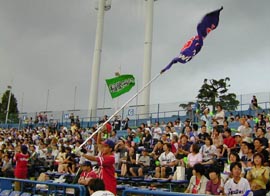 The
Mainichi Shimbun reports that in the wake of "plummeting"
ratings, Nippon Television, a subsidiary of the Yomiuri conglomerate,
will begin showing Yomiuri Giants games to their conclusion,
ending a practice spanning many years where the coverage of
games that ran over a specified time were cut so that the
broadcast of a scheduled program could be aired instead. Additionally,
the Asahi adds that fans will be treated to autograph
sessions from players and will now be allowed to keep balls
that reach the stands during weekend batting practice and
games at the Giants' home Tokyo Dome (shared with the Nippon
Ham Fighters).
The
Mainichi Shimbun reports that in the wake of "plummeting"
ratings, Nippon Television, a subsidiary of the Yomiuri conglomerate,
will begin showing Yomiuri Giants games to their conclusion,
ending a practice spanning many years where the coverage of
games that ran over a specified time were cut so that the
broadcast of a scheduled program could be aired instead. Additionally,
the Asahi adds that fans will be treated to autograph
sessions from players and will now be allowed to keep balls
that reach the stands during weekend batting practice and
games at the Giants' home Tokyo Dome (shared with the Nippon
Ham Fighters).
Still, could the telecast of games to their completion, a few game balls, and autographs possibly be sufficient to hold fan interest if more of Japan's best players head west next year? With Sluggers Norihiro Nakamura and Hideki Matsui, speedster Kazuo Matsui, and pitcher Kazuhisa Ishii all rumored to be top candidates to embark for the green pastures of the U.S. next season, it is an interesting question. Especially since the fixes now in place only apply to the Central League's Giants and leave Ichiro's former league - the Pacific League - to continue treading water in relative anonymity with dismal attendance figures and limited fan interest. Granted, Japan has the talented young arms of Daisuke Matsuzaka and Koji Uehara to take up the some slack in the event of a mass exodus. Would they be enough?
Recently, sports channel ESPN interviewed Robert
Whiting, famed author of You Gotta Have Wa - the ultimate
explanation of the subtleties and intricacies of the Japanese
game. Whiting says Japanese baseball "is doomed"
if more players choose to abandon ship. Equally ominous is
the conclusion of the Japan Times, "they won't
have any top players left in the country, any front pages
on the sports pages, very few fans watching on TV, and even
fewer fans in the stands."
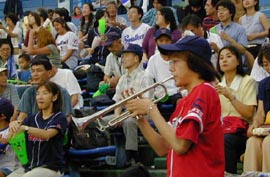 While
it may indeed be true that Japanese baseball is in need of
a relief ace to set down the side in the ninth during these
trying times, critics and management alike have not bothered
to ask what the Japanese fan thinks. The flag waving, drum
beating, horn playing, chanting, and all around noise making
denizens of each team's outfield oendan (cheering
section) provide the most loyal support and in the end are
the ultimate critics. If they did, the pundits in their ivory
newsrooms might be surprised to find out what the Japanese
game is really lacking.
While
it may indeed be true that Japanese baseball is in need of
a relief ace to set down the side in the ninth during these
trying times, critics and management alike have not bothered
to ask what the Japanese fan thinks. The flag waving, drum
beating, horn playing, chanting, and all around noise making
denizens of each team's outfield oendan (cheering
section) provide the most loyal support and in the end are
the ultimate critics. If they did, the pundits in their ivory
newsrooms might be surprised to find out what the Japanese
game is really lacking.
"We should expand the maximum number of foreign players," says Junichiro Tonotsuka, an unemployed 51-year old in speaking about the future of Japanese baseball at an evening game between the Nippon Ham Fighters and Seibu Lions at Tokyo Dome. Presently, the maximum number of foreigners on a Japanese roster is four with three (the pitcher and two position players) being the most allowed on the field at any one time. Since the media and fans are often quick to label any foreigner that does not achieve immediate success as dame (hopeless), this is an interesting recommendation. And not an isolated one either.
Kazuhiko Sumino, a 45-year old office worker, already has formulated a specific number. "Five is the best number for one team," he says. "If more than that, the Japanese style will disappear. But less than 5 is not enough." The general reasoning for this being that while foreign players are typically castoffs from the major leagues, they oftentimes can add excitement with some big hits and strong pitching. Kazuhiko says succinctly, "I like the foreign home runs. They can hit the ball farther than the Japanese players."
Performance aside, the realization that we are living in a changing world has also had its influence. An exchange of more players, some feel, will provide a beneficial learning experience for both players and fans alike. Junichiro says that this will not only enhance baseball but also business and other areas will allow us to communicate better. "Japan is tight with many rules," he scoffs. "If more good players come, then the Japanese players will receive positive influence and the Japanese game will improve." He is not alone in seeing value in the international experience.
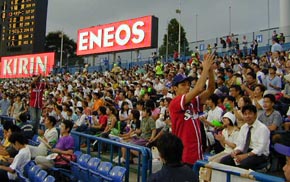 "We
should not restrict foreign players coming to Japan,"
says Tsuyuki Honda, a salesman and Nippon Ham fan. "Likewise,
if Japanese players only remain in Japan and do not see other
countries we are not living with an open mind." Mitsuyo
Nishimura, a dental assistant and mother of her young daughter
Naomi, adds, "If Ichiro stayed in Japan, he would not
have received the attention of the US. So it is good for them
(Japanese players) to go abroad and improve their ability
in playing baseball."
"We
should not restrict foreign players coming to Japan,"
says Tsuyuki Honda, a salesman and Nippon Ham fan. "Likewise,
if Japanese players only remain in Japan and do not see other
countries we are not living with an open mind." Mitsuyo
Nishimura, a dental assistant and mother of her young daughter
Naomi, adds, "If Ichiro stayed in Japan, he would not
have received the attention of the US. So it is good for them
(Japanese players) to go abroad and improve their ability
in playing baseball."
Others look positively to the future of Japanese baseball by taking the holistic approach - the game itself being bigger than the individual players. "Some people just come to see individual players," says 26-year old Maiko Ochiai. "But most people come for the game itself. Sure there are a certain number of players that I like. But I support the team first." Koichi Sakuma, a Chiba Lotte Marines' fan, 31, adds, "If Matsui (Hideki) goes abroad, there is no problem (for the Japanese game). I believe the oendan will remain enthusiastic even if the good players leave."
This is certainly not to say that fans are satisfied with today's game. They have their beefs with baseball management and want them known: the 6PM start time is too early to accommodate the average office worker, the admission prices are too high (generally $15-50), and the games are slowed by too many seemingly unnecessary meetings. While these gripes boil down to basic economics and logistics, others want management to accommodate them on a more personal level.
Yoshinori Saijo, an office manager, explains
his one complaint with a story about how he became a lifelong
Giants fan. "When I was about 10 years old, I went to
a department store on a day when Shigeo Nagashima (current
Giants manager) was signing autographs. He patted me on the
head and said, 'Be ambitious!' From that day I have loved
the Giants. You won't find today's players interacting with
the fans like that." Kazuhiko too wants some things to
go back to the way they were. "Many years ago, the children
could go onto the ground after the games and interact with
the players," he remembers. "Bringing back those
kinds of activities will make the game more interesting for
the fans."
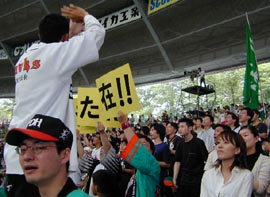 Six-year
old Naomi doesn't have any recommendations or complaints.
But, like most Japanese fans, she has hopes for a bright future.
"I want to marry Matsuzaka!" she declares.
Six-year
old Naomi doesn't have any recommendations or complaints.
But, like most Japanese fans, she has hopes for a bright future.
"I want to marry Matsuzaka!" she declares.
Ambitious indeed.
The phone rang. I walked to the kitchen. It was junior reporter Junko.
"Just finished it, my dear," I said. "But I can't give an analysis just now, the Carp are threatening in the eighth and..."
I lit a fresh cigarette... Then another... Then another... Then another.
After slamming the receiver into the cradle, I rushed back.
But before reaching my seat, the 10-5 final in the Carp's victory stared back at me from the screen. I stood in the middle of the room and turned towards the fresh sheet where two shiroari were caught by the wings and squirming from side to side.
A few Japanese players going stateside may indeed be just what the doctor ordered for Japanese baseball and its fans. But what is the cure for the common junior reporter?
Note: Fumiko Kojima and Nobuko Chuma contributed to this report.

